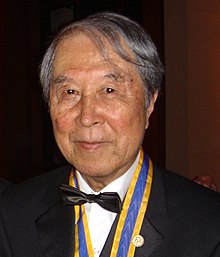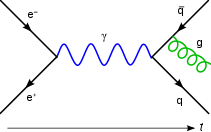| Yoichiro Nambu 南部 陽一郎 | |
|---|---|
 Nambu in 2005 Nambu in 2005 | |
| Born | (1921-01-18)18 January 1921 Tokyo, Empire of Japan (Now Japan) |
| Died | 5 July 2015(2015-07-05) (aged 94) Toyonaka, Osaka, Japan |
| Citizenship | American (from 1970) |
| Alma mater | Tokyo Imperial University |
| Known for | Spontaneous symmetry breaking String theory Nambu–Goto action Nambu-Goldstone boson Nambu mechanics Nambu–Jona-Lasinio model |
| Spouse | Chieko Hida |
| Children | John Nambu (son) |
| Awards | Heineman Prize (1970) J. Robert Oppenheimer Memorial Prize (1976) Order of Culture of Japan (1978) US National Medal of Science (1982) Max Planck Medal (1985) Dirac Medal (1986) J.J. Sakurai Prize (1994) Wolf Prize in Physics (1994/1995) Franklin Medal (2005) Pomeranchuk Prize (2007) Nobel Prize in Physics (2008) |
| Scientific career | |
| Fields | Physics |
| Institutions | IJA Research Institute of Technology (IJA 4th Research Institute of Aeronautical Technology) (1943–45) University of Tokyo (1945–49) Osaka City University (1949–52) Institute for Advanced Study (1952–54) University of Chicago (1954– 2015) |
Yoichiro Nambu (南部 陽一郎, Nanbu Yōichirō, 18 January 1921 – 5 July 2015) was a Japanese-American physicist and professor at the University of Chicago.
Known for his contributions to the field of theoretical physics, he was awarded half of the Nobel Prize in Physics in 2008 for the discovery in 1960 of the mechanism of spontaneous broken symmetry in subatomic physics, related at first to the strong interaction's chiral symmetry and later to the electroweak interaction and Higgs mechanism.
The other half was split equally between Makoto Kobayashi and Toshihide Maskawa "for the discovery of the origin of the broken symmetry which predicts the existence of at least three families of quarks in nature."
Early life and education
Nambu was born on 18 January 1921 in Tokyo, Empire of Japan (Now Japan). After graduating from the then-Fukui Secondary High School in Fukui City, he enrolled in the Imperial University of Tokyo (Now University of Tokyo) and studied physics. He was a lieutenant (technical lieutenant 技術中尉) in the Imperial Japanese Army.
He received his Bachelor of Science in 1942 and Doctorate of Science in 1952. In 1949, he was appointed to associate professor at Osaka City University and promoted to professorship the next year at the age of 29.
In 1952, Nambu was invited by the Institute for Advanced Study in Princeton, New Jersey, United States, to study. He moved to the University of Chicago in 1954 and was promoted to professor in 1958. From 1974 to 1977, Nambu was also served as the Chairman of the Department of Physics, and then he became as an American citizen from 1970 until his death in 2015.
Career in physics

Nambu proposed the "color charge" of quantum chromodynamics, having done early work on spontaneous symmetry breaking in particle physics, and having discovered that the dual resonance model could be explained as a quantum mechanical theory of strings. He was accounted as one of the founders of string theory.
After more than fifty years as a professor, he was Henry Pratt Judson Distinguished Service Professor emeritus at the University of Chicago's Department of Physics and Enrico Fermi Institute.
The Nambu–Goto action in string theory is named after Nambu and Tetsuo Goto. Also, massless bosons arising in field theories with spontaneous symmetry breaking are sometimes referred to as Nambu–Goldstone bosons.
Death
Nambu died of heart failure at the hospital in Osaka on 5 July 2015, at the age of 94. The announcement of his death was delayed until 17 July, just 12 days after his death. His funeral and memorial services were held among close relatives.
Nambu was survived by his wife, Chieko, and his son, John.
Recognition
The Nambu Hall was opened on the second floor of Osaka University Graduate School of Science, J Building in 2017.
The Osaka Metropolitan University Nambu Yoichiro Institute of Theoretical and Experimental Physics (NITEP) was founded on November 1, 2018.
Nambu won numerous honors and awards including:
- 1970: Dannie Heineman Prize
- 1977: J. Robert Oppenheimer Memorial Prize
- 1978: Order of Culture, Japan
- 1978: Person of Cultural Merit, Japan
- 1979: Honorary Citizen of Fukui City, Japan
- 1982: National Medal of Science
- 1985: Max Planck Medal, Germany
- 1986: Dirac Prize
- 1994: Sakurai Prize
- 1994/1995: Wolf Prize in Physics
- 2003: Fukui Prefectural Award, Japan
- 2005: Benjamin Franklin Medal, Franklin Institute
- 2005: Oskar Klein Memorial Lecture
- 2008: Nobel Prize in Physics "for the discovery of the mechanism of spontaneous broken symmetry in subatomic physics".
- 2011: Honorary Citizen of Toyonaka City
See also
- List of Japanese Nobel laureates
- List of Nobel laureates affiliated with the University of Tokyo
- Nambu, Yoichiro (1985) Quarks, World Scientific, Singapore
References
- ^ Nambu, Yoichiro (2008). Karl Grandin (ed.). "Les Prix Nobel – The Nobel Prizes 2008". Stockholm: The Nobel Foundation. Archived from the original on 11 October 2014. Retrieved 19 July 2015.
- ^ Hatsuda, Tetsuo. "Notable Alumni: Yoichiro Nambu". University of Tokyo. Archived from the original on 19 July 2015. Retrieved 19 July 2015.
- Chicago Tribune (October 8, 2008) "University of Chicago physicist Yoichiro Nambu wins Nobel Prize"
- Matt Moore; Karl Ritter; Mari Yamaguchi & Herbert G. McCann (7 October 2008). "Chicago Professor Shares Nobel Prize In Physics". NPR. Associated Press.
- Serway, Raymond; Moses, Clement; Moyer, Curt (2004). "Elementary Particles". Modern Physics (3rd ed.). Thomson Learning. p. 577. ISBN 1111794375. Retrieved 19 July 2015 – via Google Books.
- Xing, Zhizhong; Shun Zhou (2011). "Neutrinos within the Standard Model". Neutrinos in Particle Physics, Astronomy and Cosmology. Zhejiang University Press. p. 23. ISBN 9783642175602. Retrieved 19 July 2015 – via Google Books.
- Nambu, Y. (1970). "Quark model and the factorization of the Veneziano amplitude." In R. Chand (ed.), Symmetries and quark models (pp. 269–277). Singapore: World Scientific.
- Pesic, Peter (2014). "Unheard Harmonies". Music and the Making of Modern Science. Massachusetts Institute of Technology Press. ISBN 9780262027274. Retrieved 19 July 2015 – via Google Books.
- Jones, Andrew Zimmerman; Robbins, Daniel (2010). "Ten Notable String Theorists". String Theory for Dummies. Hoboken, New Jersey: Wiley Publishing. p. 347. ISBN 9780470595848. Retrieved 19 July 2015 – via Google Books.
- "Yoichiro Nambu". The University of Chicago. Archived from the original on 6 September 2014. Retrieved 19 July 2015.
- Narins, Brigham (2001). Notable Scientists from 1900 to the Present: N-S. Gale Group. p. 1613. ISBN 9780787617554.
- Nambu, Y.; Jona-Lasinio, G. (1 April 1961). "Dynamical Model of Elementary Particles Based on an Analogy with Superconductivity. I". Physical Review. 122 (1). American Physical Society (APS): 345–358. Bibcode:1961PhRv..122..345N. doi:10.1103/physrev.122.345. ISSN 0031-899X.
- Nambu, Y.; Jona-Lasinio, G. (1 October 1961). "Dynamical Model of Elementary Particles Based on an Analogy with Superconductivity. II". Physical Review. 124 (1). American Physical Society (APS): 246–254. Bibcode:1961PhRv..124..246N. doi:10.1103/physrev.124.246. ISSN 0031-899X.
- Grimes, William (17 July 2015), "Yoichiro Nambu, Nobel-Winning Physicist, Dies at 94", The New York Times
- ^ "南部陽一郎 大阪大学特別栄誉教授のご逝去について". 大阪大学. Retrieved 17 July 2015.
- "2008年ノーベル物理学賞受賞の南部陽一郎 大阪大学特別栄誉教授がご逝去されました". Osaka University. 17 July 2015. Retrieved 17 July 2015.
- "Nobel laureate in physics, Yoichiro Nambu dies at 94". La Prensa de San Antonio. EFE. 17 July 2015. Archived from the original on 21 July 2015. Retrieved 18 July 2015.
- 南部陽一郎ホール – 大阪大学 大学院理学研究科・理学部
- Nambu Yoichiro Institute of Theoretical and Experimental Physics (NITEP)|about NITEP
- Walter, Claire (1982). Winners, the blue ribbon encyclopedia of awards. Facts on File Inc. p. 438. ISBN 9780871963864.
- "J. Robert Oppenheimer Prize awarded to Yoichiro Nambu". Physics Today. 29 (3). American Institute of Physics: 76–78. March 1976. doi:10.1063/1.3023388.
- 福井市名誉市民・市民栄誉賞 福井市 2008年10月11日 閲覧(in Japanese)
- 名誉市民の南部陽一郎先生が逝去されました。 福井市ホームページ at the Wayback Machine (archived 2015-09-23)2015年8月11日 閲覧(in Japanese)
- "Yoichiro Nambu". Franklin Institute. April 2005. Archived from the original on 14 May 2015. Retrieved 19 July 2015.
- Jonathan Amos (7 October 2008). "Cosmic imperfections celebrated". BBC.
- Pollard, Niklas (7 October 2008). "Two Japanese, American win 2008 physics Nobel". Reuters.
- "南部陽一郎さん(平成23年9月7日 豊中市議会議決) 豊中市". www.city.toyonaka.osaka.jp. Retrieved 1 June 2021.
External links
- Oral history interview with Yoichiro Nambu on 16 July 2004, American Institute of Physics, Niels Bohr Library & Archives
- Yoichiro Nambu, Department of Physics faculty profile, University of Chicago
- Profile, Scientific American Magazine
- Yoichiro Nambu, Sc.D. Biographical Information
- Nambu's most-cited scientific papers
- Yoichiro Nambu's earliest book for the scientific layman Archived 29 June 2011 at the Wayback Machine
- Yoichiro Nambu's previously unpublished material, including an original article on spontaneously broken symmetry
- "A History of Nobel Physicists from Wartime Japan" Article published in the December 1998 issue of Scientific American, co-authored by Laurie Brown and Yoichiro Nambu
- Tribute upon Prof. Nambu passing by former student Dr. Madhusree Mukerjee
- Guide to the Yoichiro Nambu Papers 1917-2009 at the University of Chicago Special Collections Research Center
- Yoichiro Nambu on Nobelprize.org

| Laureates of the Wolf Prize in Physics | |
|---|---|
| 1970s |
|
| 1980s |
|
| 1990s |
|
| 2000s |
|
| 2010s |
|
| 2020s |
|
| 2008 Nobel Prize laureates | |
|---|---|
| Chemistry |
|
| Literature (2008) |
|
| Peace |
|
| Physics |
|
| Physiology or Medicine |
|
| Economic Sciences |
|
| Laureates of the Nobel Prize in Physics | ||
|---|---|---|
| 1901–1925 |
|  |
| 1926–1950 |
| |
| 1951–1975 |
| |
| 1976–2000 |
| |
| 2001– present |
| |
- 1921 births
- 2015 deaths
- National Medal of Science laureates
- People from Fukui Prefecture
- Imperial Japanese Army officers
- American string theorists
- Wolf Prize in Physics laureates
- Academic staff of the University of Tokyo
- University of Chicago faculty
- University of Tokyo alumni
- Japanese emigrants to the United States
- American academics of Japanese descent
- American scientists of Asian descent
- Nobel laureates in Physics
- American Nobel laureates
- Recipients of the Order of Culture
- Members of the United States National Academy of Sciences
- Institute for Advanced Study visiting scholars
- J. J. Sakurai Prize for Theoretical Particle Physics recipients
- Winners of the Max Planck Medal
- Benjamin Franklin Medal (Franklin Institute) laureates



